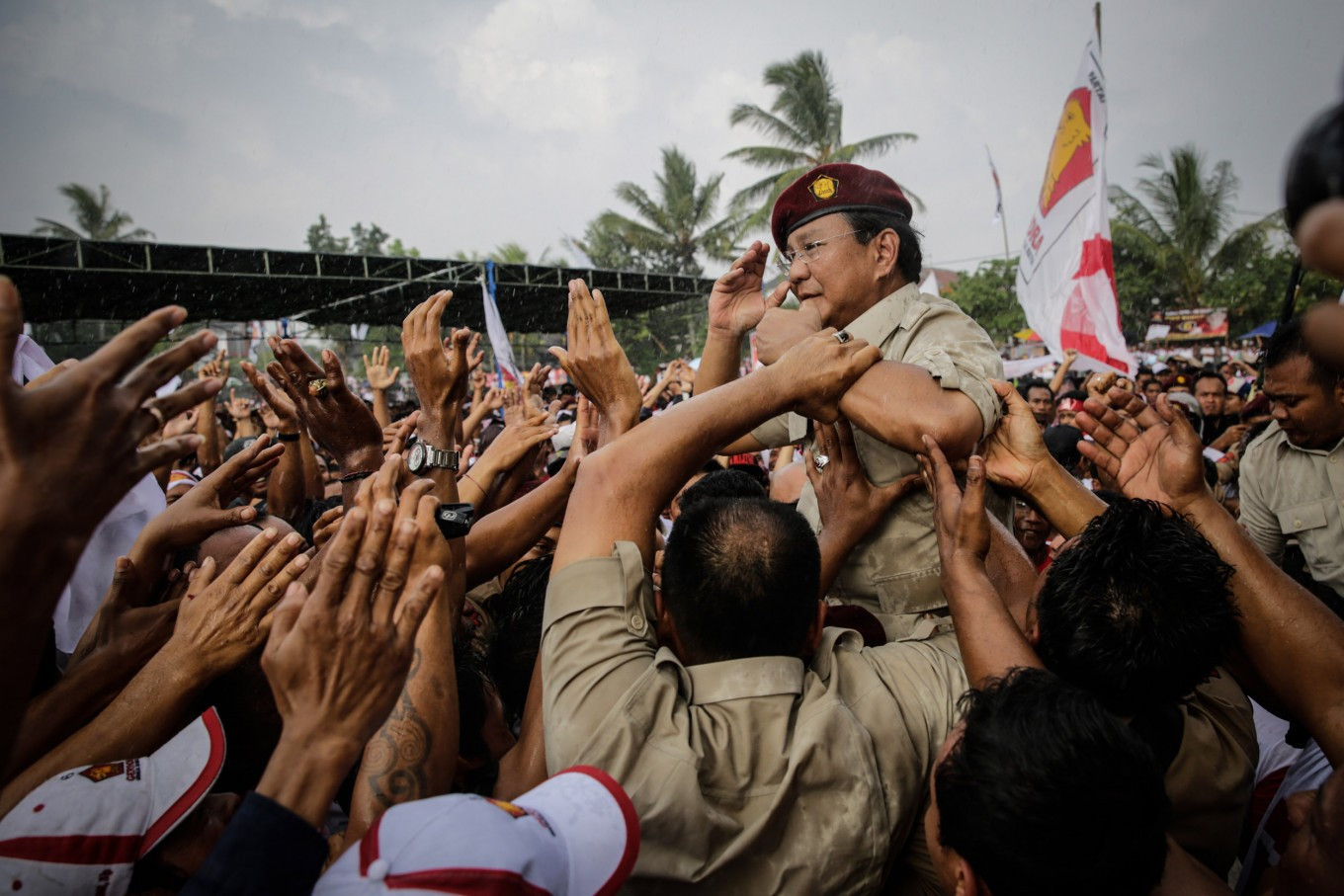News
Prabowo, Gerindra and Indonesia’s future
Tenggara Strategics February 24, 2025 Prabowo Subiyanto (center) smiles in the middle of crowd after he speak to supporters during the Gerindra Party campaign rally in Tabanan, Bali on Monday 17 March 2014. The Gerindra Party became the leading opposition party after the 2014 general election
Prabowo Subiyanto (center) smiles in the middle of crowd after he speak to supporters during the Gerindra Party campaign rally in Tabanan, Bali on Monday 17 March 2014. The Gerindra Party became the leading opposition party after the 2014 general election
As President Prabowo Subianto settles into power, the shift in the political landscape is becoming clearer, with he and his Gerindra Party at center stage. The party celebrated its 17th anniversary over the weekend at a congress attended by thousands of members, ministers, and former president Joko “Jokowi” Widodo.
Also present were leaders of the political parties that form Prabowo’s Onward Indonesia Coalition (KIM), including Bahlil Lahadalia of the Golkar Party, Zulkifli Hasan of the National Mandate Party (PAN), Surya Paloh of NasDem, Muhaimin Iskandar of the National Awakening Party (PKB), Agus Harimurti Yudhoyono of the Democratic Party and Ahmad Syaihku of the Prosperous Justice Party (PKS).
As expected, the event saw Prabowo reelected as Gerindra chairman for 2025-2030, meaning he will continue in his dual role as the head of state and the leader of a party with a strong standing in the legislature. Furthermore, Gerindra declared its intention to nominate Prabowo for reelection in the 2029 presidential race. The announcement came just a little over 100 days into his five-year presidency and almost exactly a year after the last race on Feb. 14, 2024, albeit with the caveat that he would not run if he does not perform well this term.
As he took the congress’s podium, Prabowo thanked Jokowi for helping him win the 2024 presidential election and called on all those in attendance to cheer for his predecessor. Jokowi then returned the favor by dubbing his successor the “strongest president” in the world, citing Prabowo’s 80 percent approval rating and noting the massive support behind him. “Go ahead and check all the presidents in the world right now, none are as strong as Prabowo. He is so strong at this point that I haven't seen anyone dare to criticize him,” Jokowi remarked.
Critics have rightly pointed out that the reality has been nothing but the opposite. Prabowo has continuously ignored expert advice, especially concerning the implementation of his flagship free nutritious meal program. “Even though he said he would be very open to suggestions, his gestures have come across as overly sensitive,” one analyst said.
Regardless of whether Prabowo even acknowledges the critiques thrown at him, his political influence through Gerindra, directly or indirectly, is certainly noteworthy, especially after he pronounced his idea to maintain a permanent coalition government for the remainder of his tenure.
The idea has received an enthusiastic welcome from coalition members, including Muhaimin, who ran against Prabowo last year alongside opposition candidate Anies Baswedan . “Of course, the PKB welcomes the permanent coalition. It serves to reinforce accelerated development,” he said, while Prabowo thanked him for “returning to the right path”.
The PKS, formerly known for taking a staunch, idealistic opposition role to the Jokowi administration, also welcomed the idea. “We are fully committed to the government, working together to run the administration, with the PKS as part of the ruling coalition. We will continue to support Prabowo's government until 2029,” said Ahmad Heryawan, a prominent party member.
On the other hand, the quasi-opposition Indonesian Democratic Party of Struggle (PDI-P), which sent just two senior members to attend the event, said it must “respect” the idea. “We cannot comment on the sovereignty and autonomy of other parties. The PDI-P has its stance. We will form a coalition with the people,” responded Said Abdullah from the PDI-P’s central executive board.
Like it or not, Gerindra’s political dominance is undeniable. Even though the party ranks third in terms of legislative seats, behind the PDI-P and coalition member Golkar, it rates highest in public satisfaction at 83 percent and in positive sentiment at 88 percent, according to an opinion survey by Kompas.
Furthermore, the influence of Prabowo and his party stretches across not only the executive and legislative branches, but also to regional administrations. Around 29 percent of regional leaders elected on Nov. 27 hail from Gerindra, according to a report from the Centre for Strategic and International Studies (CSIS). To compare, only 6.06 percent of regional leaders elected in 2019 were Gerindra members.
Among the current regional heads-elect are North Sumatra governor Bobby Nasution and Central Java governor Ahmad Luthfi, respectively Jokowi’s son-in-law and confidant. Along with Jokowi, Bobby was dismissed from the PDI-P for supporting Prabowo in last year’s presidential race.
Bobby and Luthfi’s entry to Gerindra underscores Prabowo’s sway in national politics. Following the regional head elections, Prabowo now controls the five most-populated provinces in the country, a feat that eluded even Jokowi during his two-term presidency.
The country must brace itself as the former army general tightens his political grip on the nation.
What we've heard
A Gerindra politician said that the idea of a permanent coalition originated from internal party discussions. The source explained that the purpose of the permanent coalition is to strengthen and consolidate Prabowo Subianto's government. Several politicians mentioned that further, more serious discussions on the permanent coalition would be brought to a party meeting.

